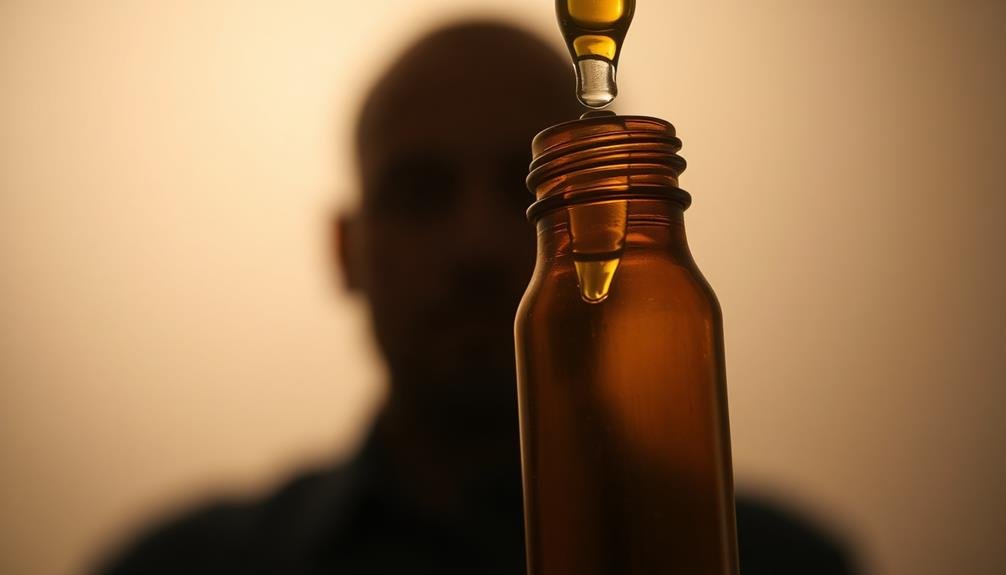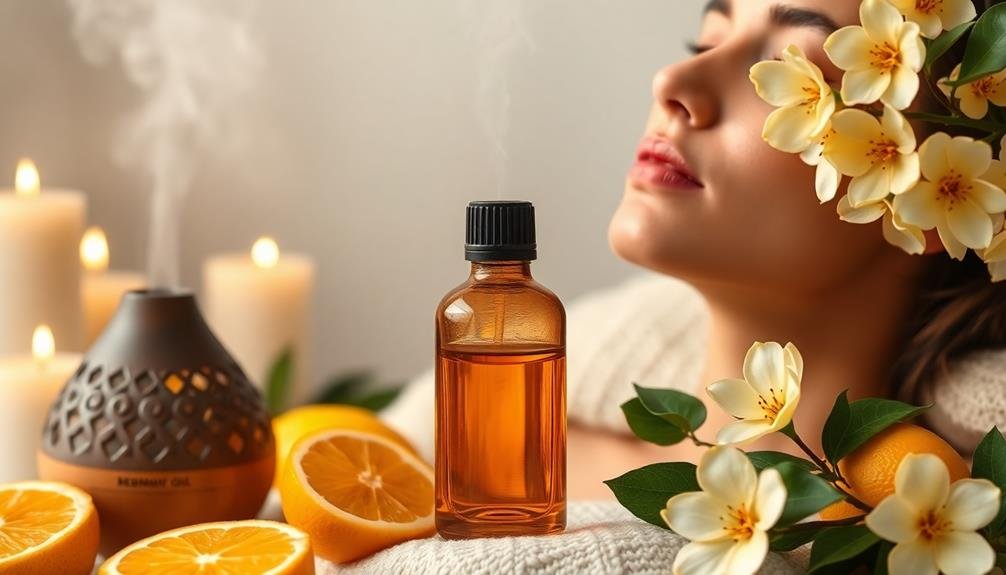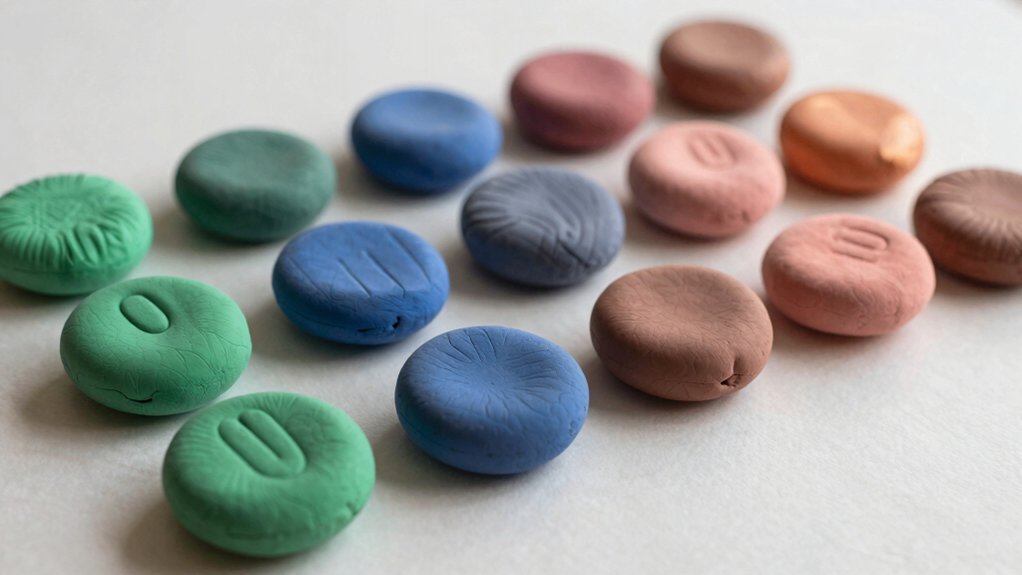Bergamot oil, extracted from the peel of the bergamot orange, is a powerful natural remedy for anxiety. You'll find its invigorating citrusy scent used in aromatherapy to reduce stress and elevate mood. To harness its calming effects, you can diffuse it, apply it diluted to your skin, or add it to your bath. It's particularly effective when blended with other soothing oils like lavender or ylang-ylang. Studies have shown bergamot can decrease anxiety levels by up to 40% when used in aromatherapy. For best results, choose a high-quality, pure bergamot oil and incorporate it into your daily self-care routine. Discover more ways this citrus wonder can transform your anxiety management.
What Is Bergamot Oil?

Curiosity often leads us to explore natural remedies for our ailments. If you're seeking relief from anxiety, you might've stumbled upon bergamot oil. This essential oil comes from the bergamot orange, a citrus fruit native to Italy. It's extracted from the peel of the fruit, which is about the size of an orange but with a more yellowish-green color.
Bergamot oil has a distinct, invigorating scent that's both citrusy and floral. You'll find it in many perfumes and as a flavoring in Earl Grey tea. In aromatherapy, it's prized for its potential to uplift mood and reduce stress. The oil contains several active compounds, including limonene and linalool, which are believed to contribute to its calming effects.
When you're considering bergamot oil for anxiety, it's important to know that it's typically used in aromatherapy through inhalation or diluted topical application. You shouldn't ingest it directly.
Quality matters too – look for pure, organic bergamot essential oil from reputable sources. Always dilute it properly before use to avoid skin irritation.
Origins and Historical Uses
Throughout history, bergamot oil has played a fascinating role in various cultures. You'll find its origins in Southeast Asia, but it's most famously associated with Calabria, Italy. The bergamot orange tree, from which the oil is extracted, has been cultivated in this region for centuries.
In traditional medicine, bergamot oil has been used to treat a variety of ailments. You'd find it in remedies for fever, infections, and digestive issues. Its aromatherapeutic properties were also recognized early on, with people using it to alleviate stress and improve mood.
Here's a quick overview of bergamot oil's historical uses:
| Culture | Traditional Use | Benefits Claimed |
|---|---|---|
| Italian | Flavoring Earl Grey tea | Digestive aid |
| Chinese | Traditional medicine | Fever reduction |
| Aromatherapy | Stress relief | Mood enhancement |
You'll also find bergamot oil in the perfume industry, where it's been a key ingredient since the 17th century. Its unique citrusy scent made it a popular choice for fragrances and colognes. Today, you can still experience these historical uses while benefiting from modern research into bergamot oil's anxiety-reducing properties.
Chemical Composition of Bergamot Oil

Delving into the chemical composition of bergamot oil reveals a complex mixture of natural compounds. You'll find that this essential oil contains a variety of terpenes, esters, and alcohols, each contributing to its unique properties and aroma.
The primary components of bergamot oil include limonene, linalool, and linalyl acetate. Limonene, a monoterpene, gives the oil its citrusy scent and potential anti-inflammatory effects. Linalool, an alcohol, is known for its calming properties and may help reduce anxiety. Linalyl acetate, an ester, contributes to the oil's floral aroma and potential pain-relieving effects.
You'll also find smaller amounts of other compounds like α-pinene, β-pinene, γ-terpinene, and bergaptene. These components work synergistically to create bergamot oil's therapeutic effects.
It's worth noting that bergaptene, a furocoumarin, can cause photosensitivity, so you should avoid sun exposure after applying bergamot oil to your skin.
Understanding the chemical makeup of bergamot oil helps explain its potential benefits for anxiety relief and overall well-being. As you explore its uses, keep in mind that the oil's composition can vary slightly depending on factors like growing conditions and extraction methods.
Anxiety-Reducing Properties of Bergamot
You'll find that bergamot oil contains mood-elevating citrus compounds that can help ease anxiety.
This essential oil has been shown to lower stress levels in several studies, potentially offering a natural alternative to conventional anxiety treatments.
Mood-Elevating Citrus Compound
Bergamot oil's mood-elevating properties stem from its unique citrus compound, which has shown promising anxiety-reducing effects. This compound, known as limonene, is found in high concentrations in bergamot and other citrus fruits.
When you inhale bergamot oil, limonene interacts with your brain's neurotransmitters, potentially increasing serotonin and dopamine levels.
These mood-boosting effects can help you:
- Feel more relaxed and at ease
- Experience reduced stress and tension
- Improve your overall sense of well-being
- Enhance your ability to cope with daily challenges
To harness bergamot oil's anxiety-reducing benefits, you can use it in various ways.
Try adding a few drops to a diffuser, creating a calming atmosphere in your home or office. You can also mix it with a carrier oil for a soothing massage or add it to your bath for a relaxing soak.
When you're on the go, simply inhaling the scent from a tissue or aromatherapy inhaler can provide quick relief.
Stress-Lowering Essential Oil
Anxiety relief may be just a few drops away with bergamot essential oil. This potent stress-lowering compound has shown promising results in scientific studies, particularly for its ability to reduce cortisol levels and promote relaxation.
You'll find that bergamot oil can help calm your nerves and ease tension when used in aromatherapy. Simply add a few drops to a diffuser or inhale directly from the bottle. The oil's soothing scent can quickly transport you to a more peaceful state of mind, making it easier to manage stress and anxiety symptoms.
For topical use, dilute bergamot oil with a carrier oil and apply it to your pulse points or the back of your neck. This method allows for prolonged exposure to the oil's calming effects throughout the day.
You can also add a few drops to your bath water for a relaxing soak that eases both mental and physical tension.
Methods of Applying Bergamot Oil

When it comes to harnessing the anxiety-reducing benefits of bergamot oil, there are several effective application methods to contemplate. You can start by adding a few drops to a diffuser, filling your space with its calming scent.
For a more direct approach, mix bergamot oil with a carrier oil like jojoba or coconut and apply it to your pulse points, such as wrists and temples.
If you're looking for a relaxing self-care ritual, try adding bergamot oil to your bath water or incorporating it into a soothing massage. You can also create a personal inhaler by placing a few drops on a cotton ball and keeping it in a small, portable container for on-the-go anxiety relief.
Here are some key points to remember when applying bergamot oil:
- Always dilute the oil before applying it to your skin
- Perform a patch test to check for any allergic reactions
- Avoid direct sunlight after topical application, as bergamot oil can increase photosensitivity
- Start with small amounts and gradually increase as needed
Blending Bergamot With Other Oils
When blending bergamot oil for anxiety relief, you'll find it pairs well with several complementary essential oils.
Lavender, ylang-ylang, and frankincense are popular choices that can enhance bergamot's calming effects.
You can create synergistic blends by combining these oils in various ratios, tailoring the mixture to your personal preferences and needs.
Complementary Essential Oil Pairings
Blending bergamot oil with other essential oils can enhance its anxiety-reducing effects and create a more complex, pleasing aroma. When combining oils, consider their individual properties and how they complement bergamot's calming nature.
Lavender, for example, is a popular pairing that amplifies relaxation and promotes better sleep. Ylang-ylang adds a floral note while supporting emotional balance. For a grounding effect, try pairing bergamot with earthy oils like frankincense or sandalwood.
To create your own bergamot-based anxiety-busting blend, experiment with these combinations:
- 3 drops bergamot + 2 drops lavender + 1 drop ylang-ylang
- 4 drops bergamot + 2 drops frankincense + 1 drop chamomile
- 3 drops bergamot + 2 drops sandalwood + 1 drop clary sage
- 4 drops bergamot + 2 drops rose + 1 drop vetiver
Remember to always dilute your essential oil blends properly before use. You can add these combinations to a diffuser, create a personal inhaler, or mix them with a carrier oil for topical application.
Synergistic Blend Recipes
Building on the complementary oil pairings discussed earlier, let's explore specific synergistic blend recipes that harness bergamot's anxiety-reducing properties.
These blends combine bergamot with other essential oils to create powerful aromatherapy solutions for anxiety relief.
- Calming Citrus Blend: Mix 3 drops bergamot, 2 drops lavender, and 1 drop orange in a diffuser. This blend promotes relaxation and mental clarity.
- Stress-Relief Blend: Combine 4 drops bergamot, 3 drops ylang-ylang, and 2 drops frankincense in a roller bottle with carrier oil. Apply to pulse points for instant calm.
- Uplifting Mood Blend: Mix 3 drops bergamot, 2 drops lemon, and 1 drop peppermint in a personal inhaler. Use when you need an emotional boost.
- Sleep Support Blend: Blend 3 drops bergamot, 2 drops chamomile, and 1 drop vetiver in a diffuser before bedtime to promote restful sleep.
- Focus and Clarity Blend: Combine 3 drops bergamot, 2 drops rosemary, and 1 drop basil in a diffuser to improve concentration and reduce anxiety-related brain fog.
Precautions and Potential Side Effects

Despite its potential benefits, bergamot oil comes with some significant precautions and possible side effects. When using this essential oil, you'll need to be aware of its photosensitizing properties. This means it can increase your skin's sensitivity to sunlight, potentially leading to burns or discoloration.
Always dilute bergamot oil properly before applying it to your skin, and avoid sun exposure for at least 12 hours after use.
Some people may experience skin irritation or allergic reactions when using bergamot oil. It's vital to perform a patch test before widespread application. If you're pregnant, nursing, or have a medical condition, consult your healthcare provider before using bergamot oil for anxiety relief.
Here are some key precautions to keep in mind:
- Never ingest bergamot oil orally
- Keep it away from children and pets
- Store in a cool, dark place to maintain potency
- Avoid using near eyes or mucous membranes
While bergamot oil is generally safe when used correctly, it can interact with certain medications, particularly those affecting blood sugar levels or blood pressure.
If you're taking any medications, it's best to check with your doctor before incorporating bergamot oil into your anxiety management routine.
Scientific Studies on Bergamot Oil
Scientific research on bergamot oil's effects on anxiety has been growing in recent years. Several studies have shown promising results, suggesting that bergamot essential oil may help reduce stress and anxiety levels.
A 2015 study published in the Journal of Alternative and Complementary Medicine found that bergamot oil aromatherapy notably decreased anxiety in patients awaiting surgery. Another study in 2017 revealed that inhaling bergamot oil reduced stress-related symptoms in rats, indicating potential benefits for humans.
Here's a summary of key studies on bergamot oil and anxiety:
| Year | Study Focus | Results |
|---|---|---|
| 2015 | Pre-surgery anxiety | Reduced anxiety levels |
| 2017 | Stress in rats | Decreased stress symptoms |
| 2019 | Workplace stress | Improved mood and well-being |
While these studies are encouraging, it's essential to recognize that more research is needed to fully understand bergamot oil's effects on anxiety. The current evidence suggests that bergamot oil may be a useful complementary therapy for managing anxiety symptoms, but it shouldn't replace professional medical advice or treatment. As with any natural remedy, you should consult your healthcare provider before using bergamot oil for anxiety.
Aromatherapy Techniques for Anxiety Relief

You can harness the anxiety-relieving properties of bergamot oil through various aromatherapy techniques.
Diffusion methods, such as using an essential oil diffuser or placing a few drops on a tissue, allow you to inhale the oil's calming scent throughout your space.
For a more direct approach, you'll find topical application techniques effective, including mixing the oil with a carrier oil for massage or adding it to your bath water.
Diffusion Methods
When it comes to using bergamot oil for anxiety relief, diffusion methods are among the most popular and effective aromatherapy techniques. These methods allow you to disperse the essential oil into the air, creating a calming atmosphere that can help ease your anxiety symptoms.
There are several types of diffusers you can use to disperse bergamot oil:
- Ultrasonic diffusers: These use water and ultrasonic vibrations to create a fine mist of oil and water.
- Nebulizing diffusers: These break down the oil into tiny particles without using heat or water.
- Evaporative diffusers: These use a fan to blow air through a pad or filter containing the oil.
- Heat diffusers: These use gentle heat to evaporate the oil and release its aroma.
To use a diffuser for anxiety relief, add a few drops of bergamot oil to your chosen device and let it run in your living space. You can diffuse the oil for 30-60 minutes at a time, several times a day.
Remember to clean your diffuser regularly to maintain its effectiveness and prevent bacteria growth. Always follow the manufacturer's instructions for your specific diffuser model.
Topical Application Techniques
Topical application of bergamot oil offers another effective method for anxiety relief through aromatherapy. To use this technique, you'll need to dilute the essential oil with a carrier oil like coconut, jojoba, or sweet almond oil.
Mix 3-5 drops of bergamot oil with 1 teaspoon of carrier oil for a safe concentration. Apply the diluted oil to pulse points such as your wrists, temples, and behind your ears. You can also massage it into your chest, neck, or shoulders for added relaxation.
Remember to patch test the mixture on a small area of skin first to check for any adverse reactions. For a soothing experience, create a bergamot-infused massage oil by adding 15-20 drops of the essential oil to 1 ounce of carrier oil.
Use this blend for a calming self-massage or ask a partner to help you unwind. You can also add a few drops of bergamot oil to your favorite unscented lotion or body oil for an anxiety-reducing boost to your daily skincare routine.
Always avoid direct sunlight after applying bergamot oil topically, as it can increase skin sensitivity.
Bergamot Oil in Daily Self-Care
Incorporating bergamot oil into your daily self-care routine can provide a calming and uplifting effect throughout the day. Start by adding a few drops to your morning shower gel or shampoo, allowing the steam to diffuse the aroma and invigorate your senses.
For a midday boost, dab a drop on your wrists or inhale directly from the bottle to combat stress and anxiety.
In the evening, unwind by adding bergamot oil to a relaxing bath or using it in a diffuser to create a tranquil atmosphere. You can also mix it with a carrier oil for a soothing bedtime massage, promoting restful sleep and reducing tension.
To maximize the benefits of bergamot oil in your self-care routine:
- Use it in a personal inhaler for on-the-go anxiety relief
- Add a few drops to your favorite unscented lotion for all-day aromatherapy
- Create a bergamot-infused linen spray for fresh, calming bedding
- Blend it with other essential oils like lavender or chamomile for a custom relaxation blend
Remember to always dilute bergamot oil properly and perform a patch test before widespread use to ascertain skin compatibility.
Choosing Quality Bergamot Essential Oil

To fully harness the anxiety-reducing benefits of bergamot oil in your self-care routine, you'll need to select a high-quality product. Look for 100% pure, organic bergamot essential oil from reputable sources. Check the label for the botanical name Citrus bergamia and verify there are no additives or synthetic fragrances.
Opt for oils packaged in dark glass bottles to protect them from light degradation. Pay attention to the extraction method; cold-pressed bergamot oil is generally considered superior. Be wary of unusually low prices, as quality bergamot oil requires significant amounts of fruit to produce.
Consider the oil's origin, as bergamot from Calabria, Italy, is often regarded as the highest quality due to the region's ideal growing conditions. Look for third-party testing results or certifications that verify the oil's purity and potency.
When purchasing, check the oil's aroma. Authentic bergamot oil should have a fresh, citrusy scent with subtle floral notes. If possible, compare different brands to identify the most potent and pleasant fragrance.
Bergamot Oil for Sleep Issues
Bergamot oil often proves beneficial for those struggling with sleep issues. Its calming properties can help you relax and unwind before bedtime, making it easier to fall asleep and stay asleep throughout the night.
When used as part of your nighttime routine, bergamot oil can signal to your body that it's time to rest, potentially improving your overall sleep quality.
To incorporate bergamot oil into your sleep routine, try these methods:
- Add a few drops to your diffuser 30 minutes before bedtime
- Mix with a carrier oil and apply to your temples and wrists
- Place a drop on your pillow or pillowcase
- Add to a warm bath before bed
Remember to use bergamot oil in moderation, as too much can be stimulating. Start with small amounts and adjust as needed.
For best results, combine bergamot oil use with good sleep hygiene practices, such as maintaining a consistent sleep schedule and creating a relaxing bedroom environment.
If sleep issues persist, consult a healthcare professional to rule out underlying conditions. While bergamot oil can be a helpful natural aid, it's not a substitute for medical treatment when necessary.
Frequently Asked Questions
Can Bergamot Oil Be Used in Cooking or Beverages?
Yes, you can use bergamot oil in cooking and beverages. It's a popular flavoring in Earl Grey tea and adds a citrusy zest to desserts and cocktails. Always use food-grade oil and start with small amounts, as it's potent.
How Long Does the Scent of Bergamot Oil Typically Last?
You'll typically notice bergamot oil's scent lasting 2-4 hours when applied topically or diffused. However, it's longevity can vary based on factors like concentration, application method, and environmental conditions. Reapply as needed for continued effects.
Is Bergamot Oil Safe for Use During Pregnancy?
If you're pregnant, it's best to consult your doctor before using bergamot oil. While it's generally safe in small amounts, some experts recommend avoiding essential oils during pregnancy. Always err on the side of caution.
Can Bergamot Oil Help With Other Skin Conditions Besides Anxiety-Related Issues?
Yes, you can use bergamot oil for various skin conditions. It may help with acne, eczema, and psoriasis due to its antibacterial properties. You'll find it can also reduce inflammation and promote healing of minor cuts and wounds.
Are There Any Sustainable or Eco-Friendly Alternatives to Traditional Bergamot Oil Production?
You'll find sustainable alternatives to traditional bergamot oil production. Look for organic farming methods, wild-harvested options, or CO2 extraction techniques. You can also support brands that use recycled packaging and practice fair trade sourcing for their bergamot oil.
In Summary
You've now discovered the power of bergamot oil for anxiety relief. It's time to incorporate this citrusy essential oil into your daily routine. Whether you're diffusing it, applying it topically, or adding it to your bath, you'll find numerous ways to harness its calming benefits. Remember to choose high-quality oils and start with small amounts. With consistent use, you'll likely notice a positive shift in your mood and stress levels. Give bergamot a try and embrace its anxiety-busting potential.





Leave a Reply